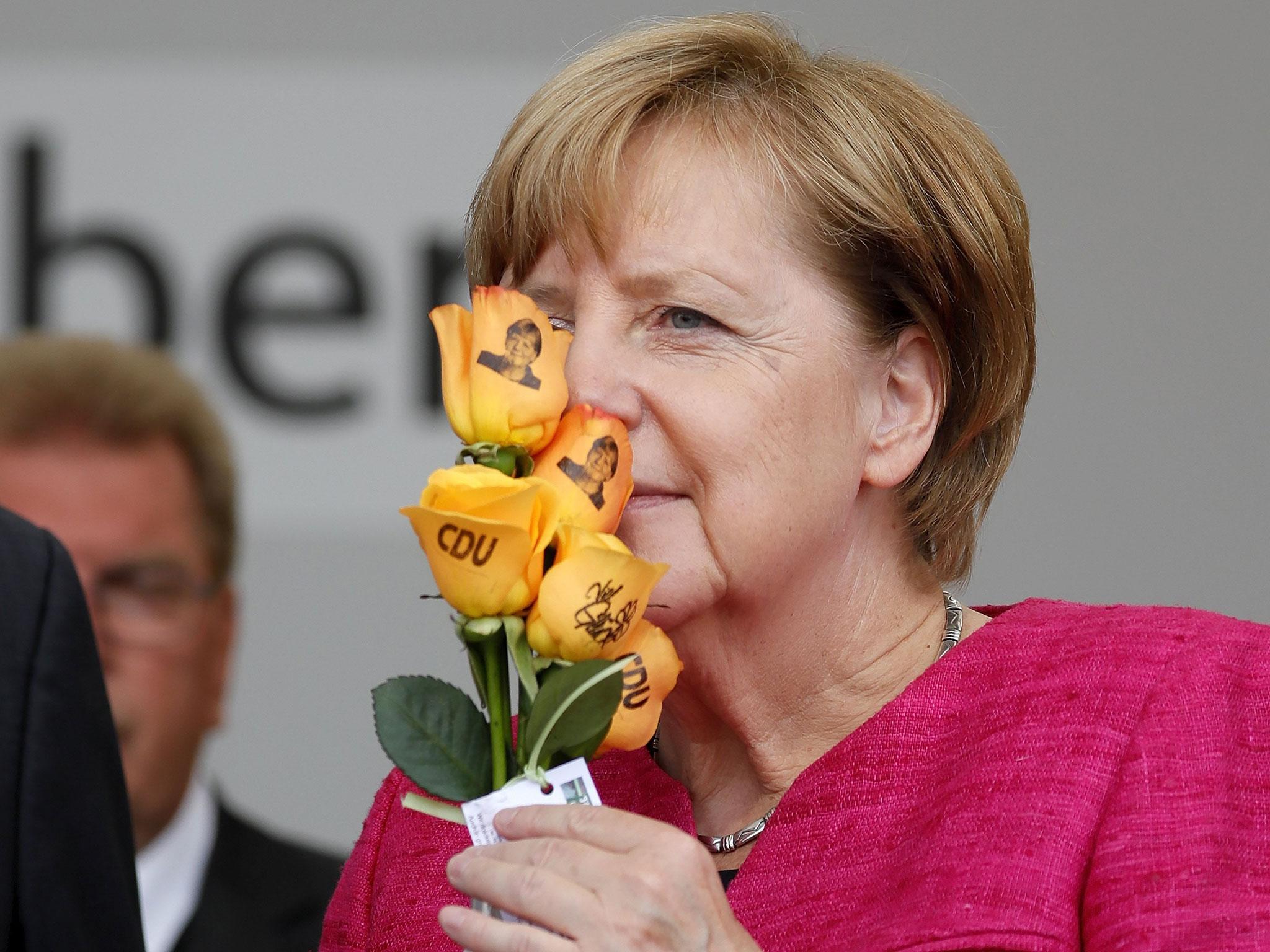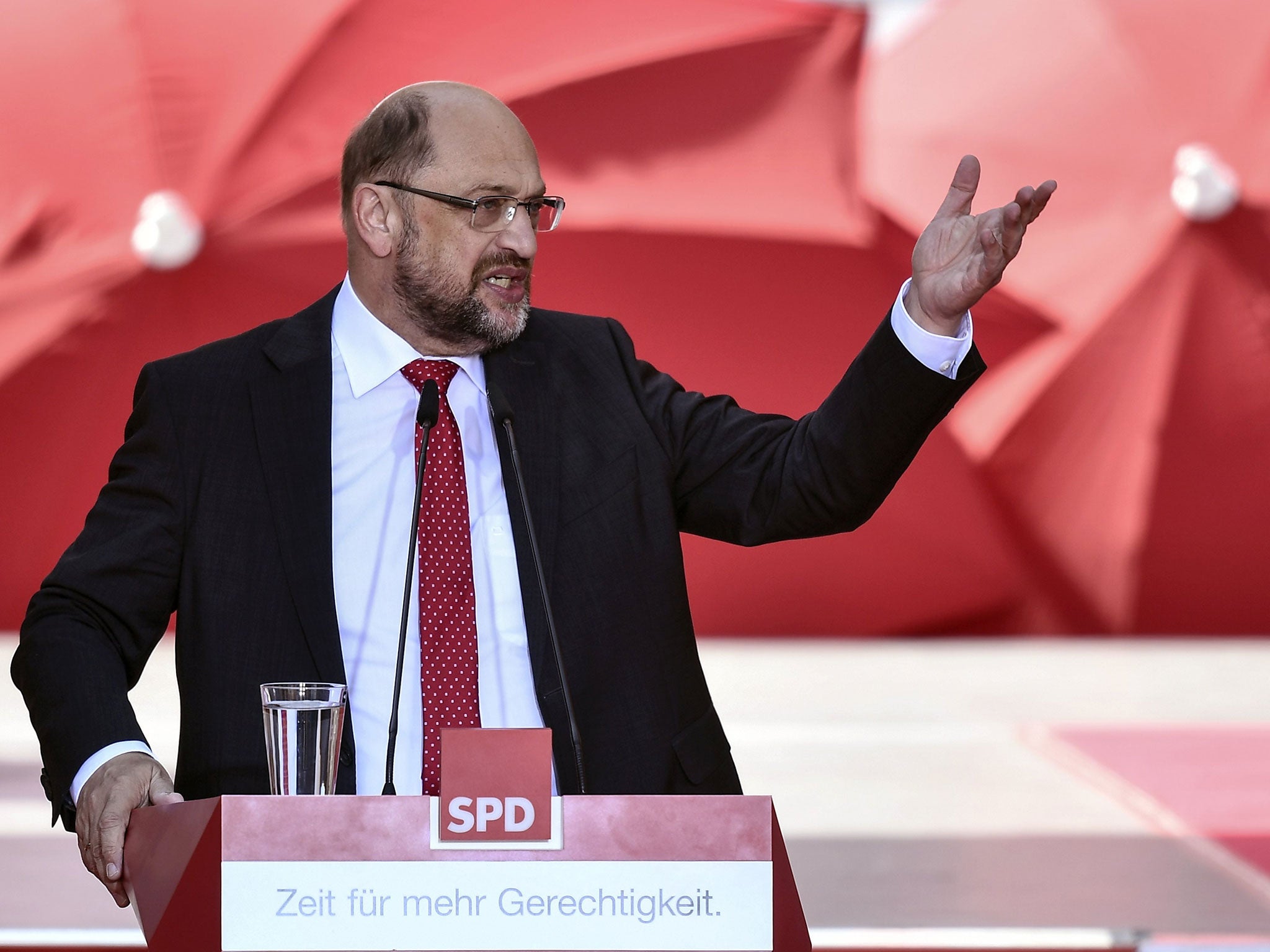German election 2017: How all-powerful Angela Merkel swallowed up the left
SPD faces threat of collapse after four years as Ms Merkel's junior coalition partner. Now its supporters say her domination of German politics represents a threat to the country's democracy

If pollsters are correct, Angela Merkel will secure her place at the helm of German politics for what could be a total of 16 years following Sunday’s election results.
The 63-year-old Chancellor has certainly provided the country with a sense of stability for more than a decade, but political apathy has gripped the nation and left many voters disillusioned about the lack of an alternative.
For the centre-left Social Democratic Party, which has ruled with Ms Merkel’s conservative alliance in a grand coalition since 2013, engaging with consensual politics has left it struggling to create any real opposition to the Christian Democratic Union during the election campaign.
Lagging in the polls with around 22 per cent of voting intentions, far behind Ms Merkel’s conservative CDU which is stable at around 37 per cent, the SPD, led by former EU Parliament President Martin Schulz, is soul-searching.
Embittered SPD voters are even jumping ship as Ms Merkel has moved further and further into the centre ground throughout her time in office.
Martin Hikel, the chairman of the SPD branch in Neukölln, an SPD stronghold in western Berlin and home to the city’s large Turkish community, told The Independent Ms Merkel’s pleasing political style had led to the “depoliticisation” of Germany.
“Merkel’s politic has followed public opinion, which means there has been no competing ideas nor real debate. This is posing a threat to our democracy. After we joined the grand coalition, people could no longer see the differences between us and the CDU. People are looking for an alternative but cannot find one,” he said.
About a third of German voters admitted in a poll last week they remained undecided about who to vote for days before the election, making the nature of the future coalition government the key question ahead of the vote.
For Stefan Kornelius, head of foreign affairs at the German newspaper Süddeutsche Zeitung and the author of a biography on Ms Merkel, the political stability of the past decade lead the left into complacency.

“On the one side, Ms Merkel provided a safe cushion for Germany for 12 years ..., but on the other, it created huge boredom and political apathy with politicians losing the sense of how challenging and competing politics can be. This has been a good strategy for Merkel because she is almost singing the country asleep,” he said.
Despite the status quo, Mr Kornelius added there had been “a tectonic shift” of the German political landscape towards the centre-right with a huge number of volatile voters moving between parties.
The revival of the pro-business, neo-liberal National Democratic Party (FPD) and the rise of the anti-immigration Alternative for Germany (AfD), which lured voters who believed the CDU no longer stood for their conservative values, have seen the proportion of right-wing voters on the rise.
In the coalition government, the SPD pushed its social policies onto the agenda with the Government passing laws on a minimum wage and closing Germany’s gender pay gap – but it was Ms Merkel who took the credit.
Rolf Henning, 34, a member of the SPD for 13 years, said his party had suffered from the grand coalition of the past four years.
He told The Independent: “For the country, the coalition was a good thing because we managed to push more social policies, but the party did not benefit from it at all. Now it’s really difficult to motivate voters to support the SPD.”
The option of another grand coalition between Ms Merkel’s conservative alliance and the SPD remains possible if the party sustains its position in the polls above 20 per cent of the votes.
“This is the SPD’s fight of its life,” said Mr Kornelius, adding: “If they get less than 20 per cent of the votes on Sunday, it will be a carnage for the party.”
Younger SPD voters are unimpressed with their party’s performance since entering the coalition. A member of the SPD’s youth organisation “Jusos”, Tim Lange, 17, said a majority of young people in the party hoped to see it bounce back by returning to its left-wing tradition.
“If the SPD did enter another a coalition with Merkel this year, it would cost us a lot of support which could be really damaging for the next election in 2021,” he said.
Back in Neukölln, Mr Hinkel believes the SPD’s salvation lies in building on trust from grassroots communities and creating a new social democratic narrative with a European vision, carried by Mr Schulz, at its core.
But even with Mr Schulz’s EU experience, the party will have to overshadow Ms Merkel’s own legacy in Europe.
The impact of Ms Merkel on the EU has been “huge and underestimated”, said Mr Kornelius. From the threat of collapse of the eurozone to pressures from Russia and her handling of the refugee crisis, Mr Kornelius said Ms Merkel had been able “to close the ranks, keep Europe together and prevent it from slipping apart” and that she intended to do the same with Brexit.
But despite her strong performance on the world stage, Ms Merkel will have to watch the mood of the people in Germany. “If people start believing they are paying too high a price to accommodate EU wishes, then there is the risk of a strong anti-European backlash,” said Mr Kornelius.
Ms Merkel’s anticipated win in Sunday’s election is bound to be her last term in office and could see the end of an extended period of drowsiness in German politics. With the future after 2021 so unpredictable, the next four years are likely to be used to prepare the ground for a new era of electoral battles in Germany.
Join our commenting forum
Join thought-provoking conversations, follow other Independent readers and see their replies
Comments